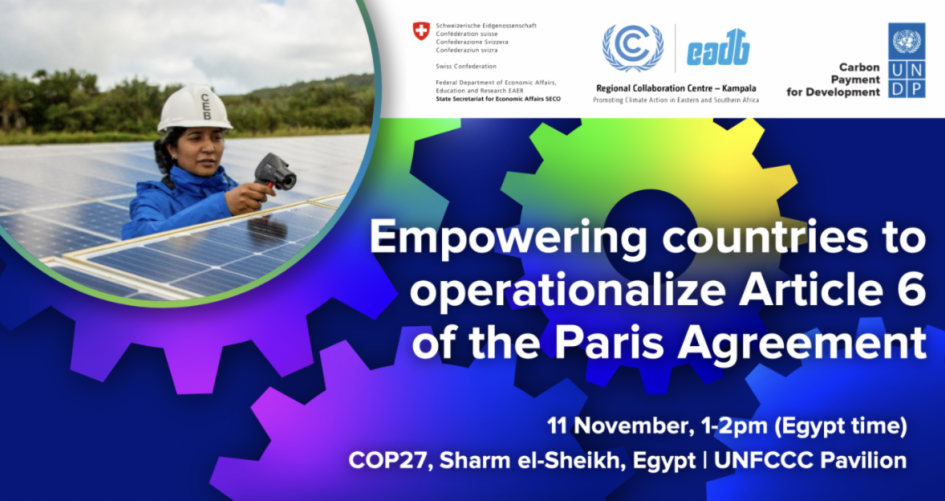The COP27 UN Climate Change Conference held from 6 to 18 November in Sharm el-Sheikh, Egypt, opens opportunity to accelerate action on Article 6 of the Paris Agreement. The Article 6 Capacity Building Online Course launched at COP27 can carry this momentum forward.
At COP27, RCC Kampala partnered with the UN Development Programme to launch an Article 6 Capacity Building Online Course on 'Operationalizing Article 6.2 of the Paris Agreement: Achieving ambitious climate action through cooperative approaches'. This online course is open to government officials, practitioners and the public. The course provides a foundational understanding needed to build an operational Article 6 framework in every country.
Empowering countries to operationalize Article 6 of the Paris Agreement
UN Climate Change Pavilion at COP27, Sharm el-Sheikh, Egypt
Friday, 11 November 2022, 13:00 Local Time (GMT +2)
The Article 6.2 course launches with two main objectives:
- Equip relevant government representatives to make decisions related to their country's participation in cooperative approaches under Article 6.2 of the Paris Agreement, with a detailed overview of the requirements and implications of their participation
- Improve understanding for policymakers and technical staff in charge of the design and implementation of processes and procedures required for the participation in cooperative approaches, including different policy, technical and processes components required to operationalize Article 6.2 in the country
The Article 6 Capacity Building Online Course supports policymakers, technical staff, government officials and public and private sector implementation partners with knowledge and resources for cooperative approaches.
Organizing partners UN Climate Change and UN Development Programme would like to thank the State Secretariat for Economic Affairs of Switzerland, SECO, and partners the Institute for Global Environmental Studies and the Swedish Energy Agency for your support to make this course possible.
Article 6 Overview
Decisions in Glasgow on Article 6 of the Paris Agreement outlined specific focus areas for capacity building for Article 6.2 and 6.4. The relevance of cooperative approaches for NDC implementation doubled, with the number of countries indicating they plan to use voluntary cooperation increasing from 46% to 85% in new and updated NDCs.
An Article 6 Capacity Building Work Programme was developed to identify institutional needs such as strengthening the infrastructure and knowledge base, ensure the availability of well-structured information that is easy to understand by all stakeholders, identify appropriate types of capacity building and enhance technical capacity for determining baseline, monitoring and reporting.
The Article 6 Work Programme includes a thorough assessment of capacity building needs, priorities and challenges of the countries and regions was conducted. Consultations with diverse stakeholders were also performed. UN Climate Change carried out the needs assessment in four stages:
- Three virtual regional dialogues on Article 6 were held throughout the year organized with the RCCs
- A survey on capacity-building needs for cooperative approaches referred to in Article 6 was performed
- Survey results were shared and validated at an SB 56 side event, at Regional Climate Weeks and at a hybrid workshop for Article 6.2 and 6.4 held in October 2022
- The Work Programme was presented to the Article 6.4 Subsidiary Body for input
Designated National Authorities (DNAs) were engaged in this process at DNA meetings held during the Regional Climate Weeks – LACCW 2022 in Latin America and the Caribbean and ACW 2022 in Africa.

